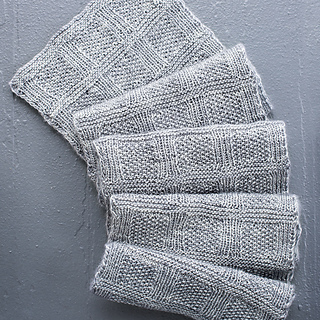patterns >  Bullseye Knits
Bullseye Knits
> Glenn's Scarf








Glenn's Scarf
For warmer climates or warmer seasons, everyone loves wearing a light-weight scarf. But it’s difficult to find a pattern that isn’t too feminine or dainty. This addicting pattern utilizes knit and purl stitches to create a geometric motif which anyone can wear. The stitch texture adds interest and depth to the fabric and also looks great on both sides.
How much more versatile can a scarf be? Reversible. Light-weight. Unisex.
Instructions are charted and written, making this a good project for beginners learning to follow a stitch pattern or pros looking for an easy-to-memorize chart.
Yarn
700yds / 640m fingering weight yarn OR 1000yds / 914m lace weight yarn
Fingering weight version (light gray) shown in Knitted Wit Single Fingering (100% Merino, 475yds / 434m, 4.06oz / 115g) in Silver Lining.
Lace weight version (dark gray) shown in Belisa Cashmere Fine Australian Cashmere (100% cashmere, 1000yds / 914m, 3.53oz / 100g) in Charcoal Gray.
Needles and Notions
Adjust needle size as needed to obtain gauge.
US 2 / 2.75mm for fingering weight yarn OR US 4 / 3.5mm for lace weight yarn
Tapestry needle
Gauge
28 sts = 4” / 10cm in stockinette stitch after blocking
Finished Dimensions
Length: 65” / 165cm
Width: 8” / 20.5cm
Note
Garter stitch naturally has a looser gauge than ribbing and seed stitch. Therefore while you are knitting, the garter stitch sections of the scarf will be slightly wider than the non-garter stitch sections. With lace weight or fingering weight yarn, this variance easily blocks out, giving the final scarf an even edge.
However, with heavier yarns this may not be the case. If you are concerned with how your yarn will behave, work up and block a swatch. If the scarf edges do not even out and this bothers you, simply switch to a smaller needle when working the garter stitch sections. This will give you a tighter gauge which is more consistent with the rest of the scarf and therefore will straighten up the edges.

266 projects
stashed
380 times
594 projects
stashed
755 times
- First published: January 2010
- Page created: January 1, 2010
- Last updated: August 21, 2022 …
- visits in the last 24 hours
- visitors right now




